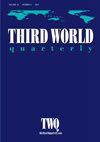社会资本与适应气候变化联系的潜力和陷阱:对菲律宾土著人民的探索性研究
IF 1.8
2区 经济学
Q2 DEVELOPMENT STUDIES
引用次数: 0
摘要
摘要气候变化的影响在不同的地理区域和社会中各不相同,因此,基于当地知识、社会凝聚力和社区动态的特定环境适应战略的价值是基础。本文探讨了社会资本在适应气候变化方面的潜力和陷阱——这是气候变化和土著发展文献研究中一个未被充分探索的领域。2018年至2019年年中,采用定性案例研究设计,对菲律宾东米沙亚斯的14名马曼瓦斯人和两名政府社会工作者进行了访谈和焦点小组讨论。我们的研究结果表明,尽管Mamanwas“实质性的社会资本纽带有助于他们的社区安全,免受极端天气的影响,适应气候变化,但它也无意中导致了潜在的不利条件,这可以从他们与更广泛的社区和政府机构脆弱的资本纽带中推断出来。”。本研究认为,社会资本是适应的重要社会方面;因此,政策制定者和发展工作者必须考虑到适应的多种规模和形式,并认识到让土著人民参与、赋权和融入他们的政治声音,以制定他们认为对人类发展相关和紧迫的问题的解决方案的重要性。本文章由计算机程序翻译,如有差异,请以英文原文为准。
Potentials and pitfalls of social capital ties to climate change adaptation: an exploratory study of Indigenous Peoples in the Philippines
Abstract Climate change’s impacts vary across different geographical regions and societies, thus, underpinning the value of context-specific adaptation strategies grounded in local knowledge, social cohesion and community dynamics. This paper explores the potentials and pitfalls of social capital to climate change adaptation – an underexplored area of inquiry on climate change and Indigenous development literature. A qualitative case study design was used to conduct interviews and a focus group discussion with 14 Mamanwas and two government social workers in Eastern Visayas, the Philippines, from 2018 to mid-2019. Our findings suggest that while Mamanwas’ substantial bonding social capital ties contribute to their communal safety from weather extremes and adaptation to climate change, it has also unintentionally resulted in potentially adverse conditions, as can be deduced from their fragile bridging and linking capital ties with the broader community and government institutions. This research argues that social capital constitutes a vital social aspect of adaptation; therefore, policymakers and development workers must account for multiple scales and forms of adaptation, as well as acknowledge the importance of engaging, empowering and incorporating the political voice of Indigenous Peoples in crafting solutions on issues they consider relevant and urgent to their human development.
求助全文
通过发布文献求助,成功后即可免费获取论文全文。
去求助
来源期刊

Third World Quarterly
DEVELOPMENT STUDIES-
CiteScore
4.10
自引率
15.00%
发文量
137
期刊介绍:
Third World Quarterly ( TWQ ) is the leading journal of scholarship and policy in the field of international studies. For almost four decades it has set the agenda of the global debate on development discourses. As the most influential academic journal covering the emerging worlds, TWQ is at the forefront of analysis and commentary on fundamental issues of global concern. TWQ examines all the issues that affect the many Third Worlds and is not averse to publishing provocative and exploratory articles, especially if they have the merit of opening up emerging areas of research that have not been given sufficient attention. TWQ is a peer-reviewed journal that looks beyond strict "development studies", providing an alternative and over-arching reflective analysis of micro-economic and grassroot efforts of development practitioners and planners. It furnishes expert insight into crucial issues before they impinge upon global media attention. TWQ acts as an almanac linking the academic terrains of the various contemporary area studies - African, Asian, Latin American and Middle Eastern - in an interdisciplinary manner with the publication of informative, innovative and investigative articles. Contributions are rigorously assessed by regional experts.
 求助内容:
求助内容: 应助结果提醒方式:
应助结果提醒方式:


